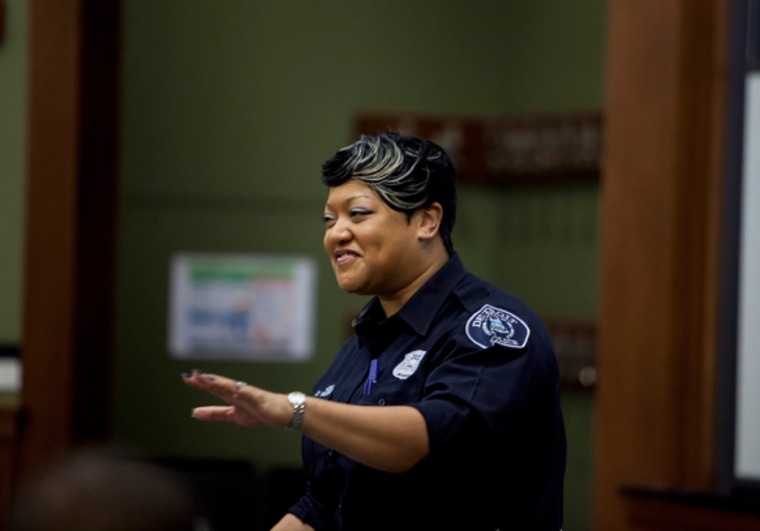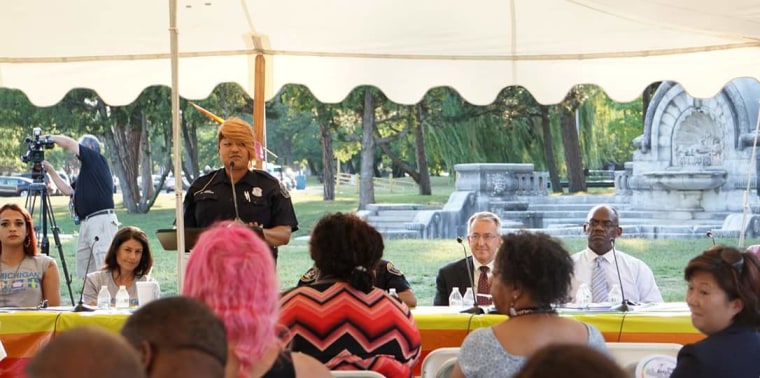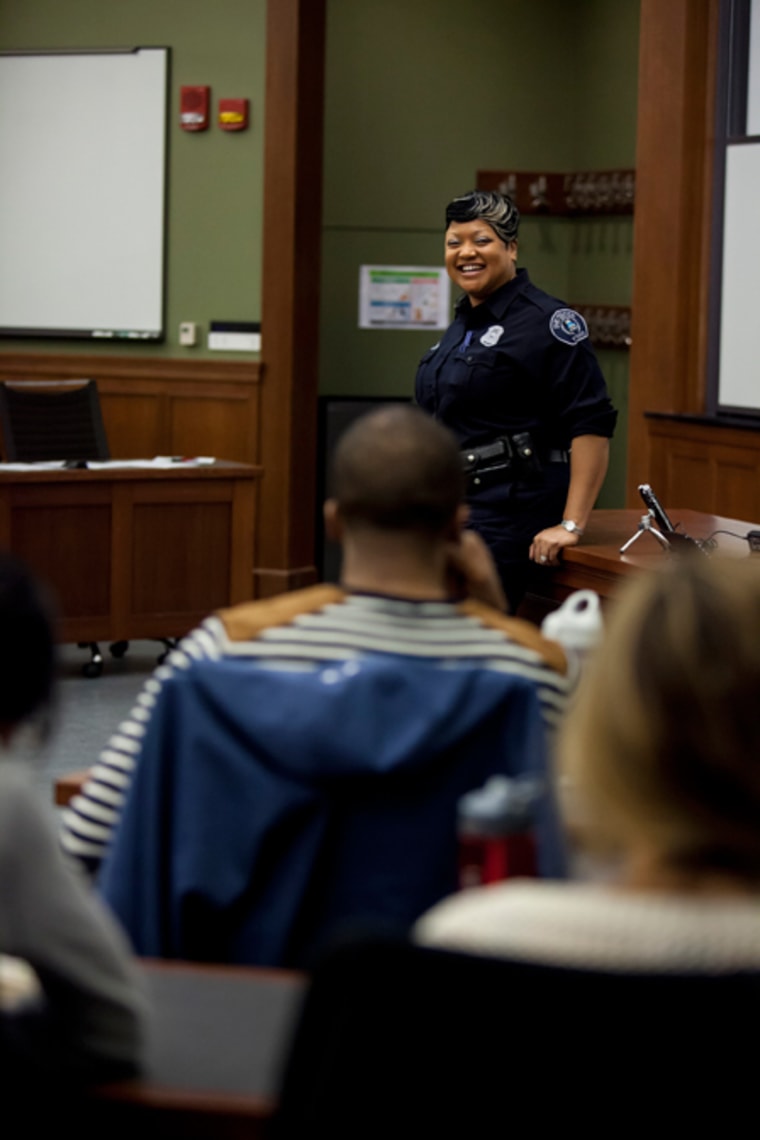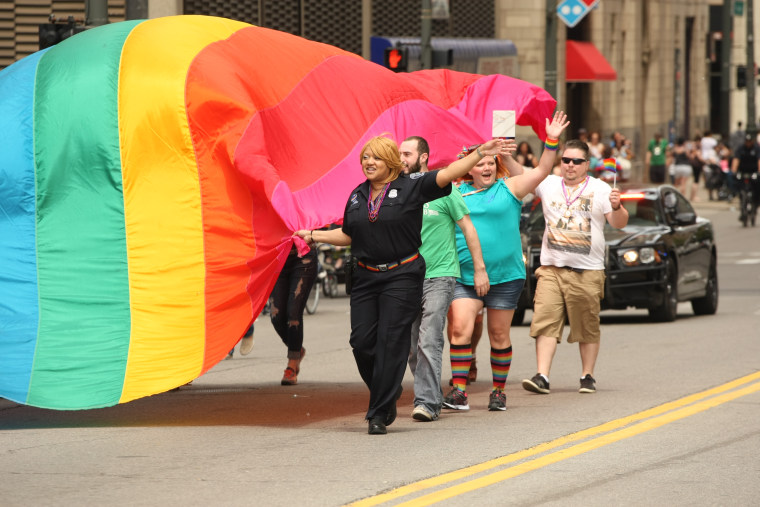Detroit police officer Danielle Woods was responding to a domestic violence call involving a lesbian couple in 2006 when her partner made a comment that angered her.
“I wonder which one of them is the man,” Woods recalled the officer saying.
“It was unprofessional, and it was offensive,” Woods told NBC OUT. After they handled the conflict, Woods, who is a lesbian herself, confronted the officer about what he said. She also reported it to her supervisor.
The incident gave Woods the idea to create an LGBTQ liaison unit for the Detroit Police Department. She said law enforcement has had a historically troubled relationship with the LGBTQ community in the predominantly Black city, and that was something she wanted to change.

The problem reflects a nationwide issue: In a 2015 study from the the National Coalition of Anti-Violence Programs, 25 percent of LGBTQ survivors of intimate partner violence reported experiencing interactions with police that were either indifferent or hostile, and those experiences were exacerbated with LGBTQ survivors of color.
“In my heart, I felt like if we had someone to answer these kinds of calls or just be there for the LGBT community, maybe you wouldn’t have these kinds of responses from officers,” she said.
Woods approached the department chief about creating an LGBTQ liaison unit after the incident. But her idea wouldn’t come into fruition until 2013, when the department’s new chief, James Craig, appointed Woods to be the first liaison to the LGBTQ community.
“The LGBT community had been ignored and ostracized for so long, and now they have a shoulder and an ear and someone they can talk to [about] their concerns."
As liaison, Woods provides sensitivity and awareness training to new officers, personally assists LGBTQ crime victims and addresses complaints from members of the community who report negative experiences with police. She also set up an advisory board made up of members of Detroit’s LGBTQ community to work with the police.
“I went so far as to pick up people to make statements if they have been victimized and they are afraid, and I’ve sat with them, too, just to be their ear and shoulder to let them know that law enforcement does care,” she said.
Woods recalled an incident in which she helped a gay man who was the victim of a carjacking. The man had unwittingly set up a date with the perpetrator, who lured him through a fake online dating profile, Woods said. She called the victim several times and convinced him to make a report. She even drove him to the precinct to do so.
“He was afraid even to come forward, because he just didn’t know if his case was going to be taken seriously or be investigated due to the fact that he had set up to meet with a man online. After a couple conversations, I spoke with him and assured him that everything will be fine as far as him coming to make his statements,” Woods added.

Woods is also helping the community on a larger scale. She organized a “community chat” between law enforcement and the LGBTQ community in Detroit’s historic Palmer Park, a popular LGBTQ hangout. The department held its second such event in August, and more than 100 people showed up. She said their main concern was that the police didn’t seem to care about them.
“The LGBT community had been ignored and ostracized for so long, and now they have a shoulder and an ear and someone they can talk to [about] their concerns,” Woods said.
Woods enthusiastically added that for the first time in Detroit’s history, a transgender woman signed up for the police academy. It was the woman’s life-long dream to be a cop, but she was afraid she wouldn’t be accepted, Woods said. After a heart-to-heart talk with Woods, the woman ultimately decided to join the force.
“She was nervous about applying, because she felt as if she was going to be judged or ridiculed, but none of that happened,” Woods said. “We accepted her just like we accept everyone else.”

Woods, 35, called herself “an open book,” who always has a smile on her face. “If I’m not smiling, there’s an issue,” she said with a laugh. She keeps her cell phone on “so people from the community [can] call me all the time if they have an issue.”
Woods said the department has been successful in making change. In July, Chief Craig announced police will work alongside a community nonprofit on a new program, the Fair Michigan Justice Project, created to investigate crimes against the LGBTQ community. But while a great deal has changed, Woods acknowledged there is still work to be done.
“I’ve noticed the positive relationship that has been built. The trust is not 100 percent, but it’s definitely better than what it was,” she said. Woods said the LGBTQ community and law enforcement both need to work to understand one another better.
“I need for the community to understand that it’s not always about your gender or your identity, sometimes you have to recognize that certain circumstances are exactly what they are — they are circumstances,” she said. “And with the police, they need to understand that sometimes you’re going to come into an uncomfortable situation, but you have to face it, because it’s not how the person identifies or their orientation. This is a person who has called you for help. You are still a servant.”
Woods added that all too often, LGBTQ people are too afraid to report crimes that happen to them, and most crimes go unreported as a result.
“Don’t be ok with being a victim,” Woods said. “[And] if you see something, say something.”
OutFront is a weekly NBC OUT series profiling LGBTQ people who are making a positive difference in the community.

